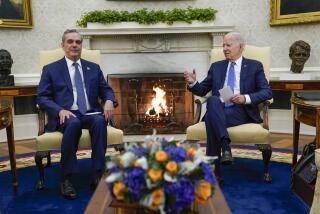Time to include Cuba
- Share via
Once again, Cuba was absent from the Summit of the Americas. Yet the communist nation might as well have attended the gathering last weekend in Cartagena, Colombia, because it took center stage, despite U.S. efforts to focus on other issues.
Ecuador’s president refused to attend the summit in protest of Cuba’s exclusion. Colombian President Juan Manuel Santos and Brazil’s Dilma Rouseff, both moderates rather than left-wingers, said there should be no more Summits of the Americas without Cuba. A leftist bloc of nations that includes Venezuela, Nicaragua, Bolivia and some Caribbean countries said it won’t participate again unless Cuba does. And the meeting ended without a final joint declaration because the United States and Canada refused to agree to language specifying that Cuba would be invited to future summits.
The controversy should serve as a wake-up call to the United States: The policy of banning Cuba from the gathering of the hemisphere’s leaders for nearly 18 years is backfiring. It hasn’t led to regime change any more than the 50-year-old U.S. trade embargo on Cuba has; it hasn’t persuaded President Raul Castro or, before him, his brother Fidel to embrace democratic reforms, hold free elections or abandon human rights abuses. Instead, it has fueled frustration among Latin leaders. Today, the United States is the only country in the hemisphere that has not restored diplomatic relations with Havana. Even the Organization of American States, sometimes called an instrument of U.S. foreign policy, cleared the way for Cuba to return to the group in 2009.
The Obama administration has denied that its goal in excluding Cuba is to keep Cuban American voters in Florida happy during a presidential election year. Whatever the reason, the position is not playing well with leaders in the region, who see embargoes and political isolation as anachronistic policies from the Cold War era.
The United States should abandon its push to keep Cuba from attending the Americas summit. Engagement, not isolation, is the best way to encourage change without alienating allies.
More to Read
Sign up for Essential California
The most important California stories and recommendations in your inbox every morning.
You may occasionally receive promotional content from the Los Angeles Times.













